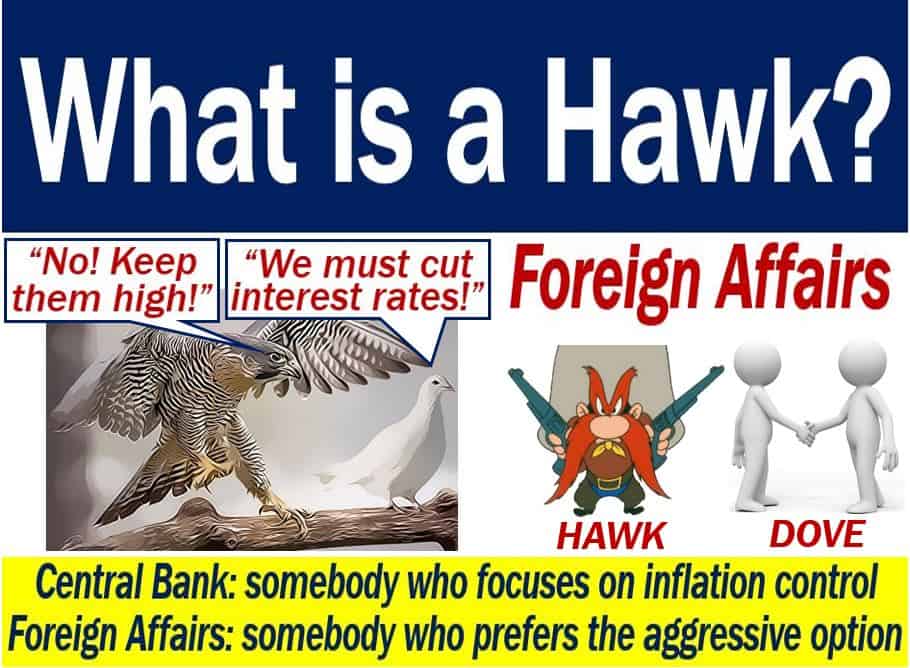Hawk – definition and meaning
A Hawk is an advisor or policymaker who usually prefers interest rates to be relatively high. Hawks focus on keeping inflation under control. They use interest rates to keep down inflation. A hawk, in non-financial English, is a medium-sized bird of prey with rounded wings and a long tail. In fact, the term refers to a group of birds of the family Accipitridae.
In foreign affairs, hawks are people who believe in an aggressive approach. They strongly support the use of force rather than discussions in political relationships.
This article focuses on the word ‘hawk’ when used in economics, business, and finance.
Central bank hawk
The US central bank, the Federal Reserve (Fed), has a joint mandate to maintain low inflation and maximize employment.
It also has a mandate to prevent steep fluctuations in interest rates, i.e., to limit interest rate volatility.
The employment and inflation mandates affect each other adversely. For example, if employment rises to fast there is a greater risk of rising inflation.
Conversely, if the Fed raises interest rates too aggressively to control inflation, employment may shrink. In other words, unemployment may rise.

Members of the Fed’s Federal Open Market Committee (FOMC) who put more weight on the inflation goal are hawks. The FOMC is a 12-member committee within the Fed that sets US monetary policy. FOMC members, for example, set the discount rate and Fed funds target.
Most central banks of the advanced economies aim for an annual inflation target of 2%. A typical hawk, however, prefers a lower target of perhaps 1% or 1.5%.
The Financial Times glossary of terms says the following:
“A hawk is a FOMC member who puts more weight on the inflation goal. Hawks are more inclined to favour tight policy to prevent excess inflation.”
‘Tight policy’ in this context means relatively high interest rates. Hawks also dislike measures to kick-start the economy, such as injecting money into the economy.
Hawk vs. dove
A monetary dove is the opposite of a monetary hawk. A foreign affairs dove is the opposite of a foreign affairs hawk.
Monetary hawks place keeping inflation low as a top priority. Doves, on the other hand, favor expansionary monetary policy.
Put simply; doves prefer lower interest rates than hawks. Doves favor injecting money into the economy to kick-start it, but not hawks. Doves, in contrast to hawks, advocate for lower interest rates to encourage borrowing and spending, which can lead to economic growth.
This expansionary policy preferred by doves is based on the belief that lower interest rates will increase investment and consumption, which can help alleviate unemployment during economic downturns.
The two terms, with their monetary policy meanings, originated in the United States. However, today, most native-English-speaking countries are familiar with the terms and use them.
Some financial journals use the term ‘pigeon‘ to describe somebody who is neither a dove nor a hawk. In other words, a pigeon is a ‘centrist.’
Somebody may be a dove in some cases and a hawk in others. Janet Yellen, for example, was a hawk during the 1990s economic boom. However, she was a dove when she was nominated to Chair the Fed. In February 2014, Yellen became the first woman to Chair the Fed.
Compound phrases with ‘hawk’
There are many compound phrases with the term ‘hawk’ in them. Let’s have a look at five that are related to finance/economics:
-
Inflation Hawk
A policymaker or advisor who is primarily concerned with keeping inflation low, often advocating for higher interest rates. As in:
“The new central bank governor is an ‘inflation hawk,’ always warning about the dangers of unchecked price rises.”
-
Deficit Hawk
An individual, often a politician or economist, who places great importance on reducing government deficits and debts. For example:
“The senator is a well-known ‘deficit hawk,’ pushing for budget cuts to lower the national debt.”
-
Rate Hawk
A member of a monetary policy committee* who is inclined towards increasing the interest rates to prevent inflation. For instance:
“With the economy overheating, the ‘rate hawks’ on the committee voted for an immediate interest rate hike.”
* A monetary policy committee is a decision-making body of a central bank that sets the direction of monetary policy, such as interest rates.
-
Fiscal Hawk
A person who is very concerned with fiscal policy, especially in terms of maintaining a balanced budget and avoiding fiscal deficits. As in:
“Despite political pressure, she remained a ‘fiscal hawk,’ insisting on spending cuts to balance the budget.”
-
Bond Hawk
An investor or analyst who anticipates and may advocate for higher interest rates, which could negatively impact bond prices. For example:
“The ‘bond hawks’ are coming out in force, predicting that rising inflation will erode bond returns.”
Video – What is a Hawk?
This video, from our YouTube partner channel – Marketing Business Network – explains what a ‘Hawk’ is in business/political English, using simple and easy-to-understand language and examples.

